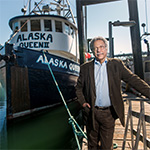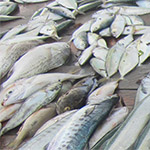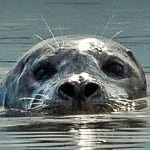SAVE OUR SEAS: Why is translating good science into good policy so hard?
University Killam Professor Lecture Series, featuring Dr. Daniel Pauly, will take place on March 28 at 6:30 pm, and Science World. Tickets SOLD OUT. Waitlist available
Daniel Pauly named “Scientist of the Year” by Radio Canada
Pauly is being recognized for his lifelong research efforts on the human impacts on global fisheries, which hit a high note in 2016 with two major publications, both co-authored with Dirk Zeller.
Rashid Sumaila wins Benchley Ocean Award for Excellence in Science
Referred to as the “Academy Awards for the ocean,” the Benchley awards are the world’s preeminent ocean awards.
Daniel Pauly and Dirk Zeller receive Ocean Award
Dr. Daniel Pauly and Dr. Dirk Zeller received the Ocean Award in the Science category for their contributions to marine conservation and ocean health.
Top 10 Ocean Conservation Wins of 2016
National Geographic released their list of 2016’s Top 10 Ocean Conservation wins, and work by IOF’s Sea Around Us project is #1.
Global climate target could net additional six million tons of fish annually
The researchers found that some oceans are more sensitive to changes in temperature, and will have substantially larger gains from achieving the Paris Agreement.
Rashid Sumaila named a Hokkaido University Ambassador
Dr. Sumaila has an international reputation as a scholar specializing in bioeconomics, marine ecosystem valuation and the analysis of global issues such as fisheries subsidies, IUU (illegal, unreported and unregulated) fishing, and the economics of high and deep seas fisheries.
Seafood consumption 15 times higher among Indigenous than non-Indigenous people
In the first global-scale analysis of its kind, the study estimated that coastal Indigenous people consume 74 kilograms of seafood per capita, compared to the global average of 19 kilograms.
BC Marine Mammal Symposium
The entire event is being broadcast live on YouTube, Saturday, November 26 from 9:30 a.m. to 5:00 p.m. Pacific Time.
Daniel Pauly awarded the 2016 Albert Ier Grand Medal in the Science category
This prestigious prize is given to great names of the marine world by the Oceanographic Institute (Monaco). Dr. Pauly is a world-renowned leader in the fields of fish biology, fisheries science and biodiversity research.









